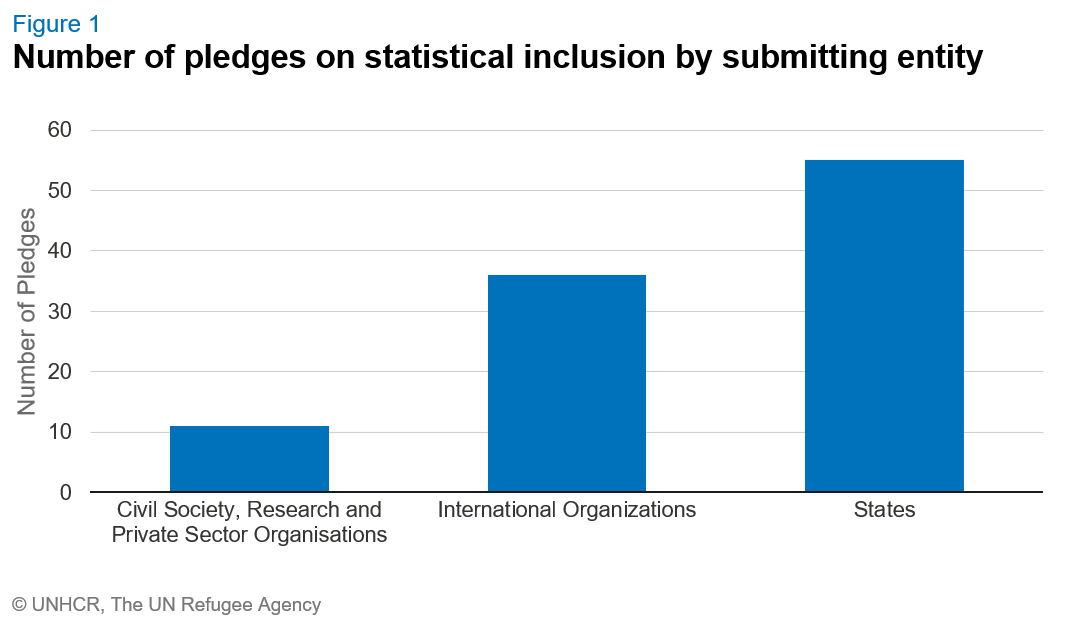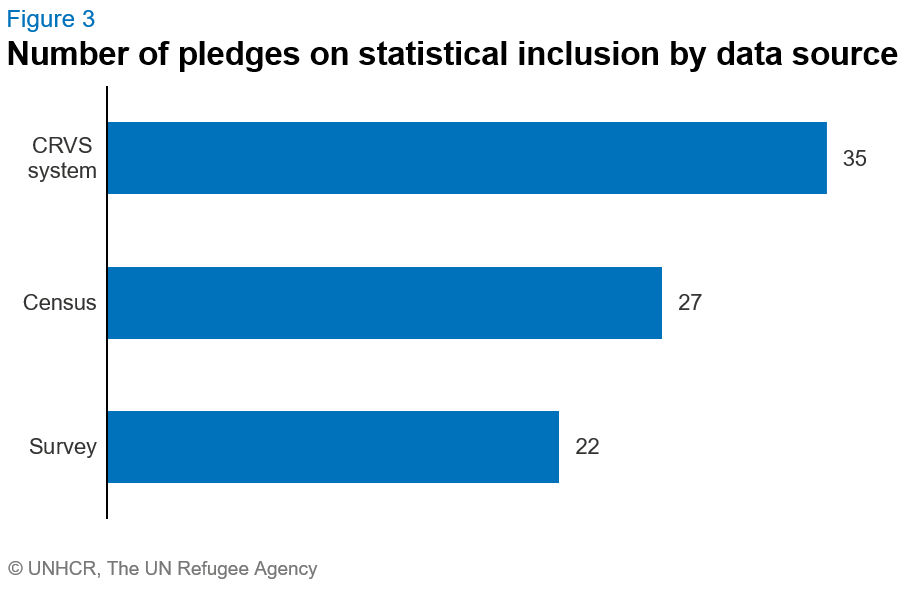
UN High Commissioner for Refugees Filippo Grandi, left, greets leaders attending the final plenary and Closing Ceremony of the Global Refugee Forum 2023. ©UNHCR/Olivier Chamard
By Aina Helen Saetre, Grace Sanico Steffan and Janis Kreuder
Forcibly displaced persons, including refugees and internally displaced people (IDPs), as well as stateless persons are frequently underrepresented or invisible in national data. However, realiable and nationally owned data is vital to guide effective national policies and decisions that foster the inclusion of forcibly displaced and stateless persons around the world. Statistical inclusion of forcibly displaced and stateless persons refers to the process of systematically including these groups in national data production systems such as population and housing censuses, administrative registers or nationwide household surveys.
Why Statistical Inclusion Matters
Accurate and disaggregated data on displaced and stateless persons, such as demographics and socio-economic conditions, is essential for governments to make informed policy decisions that support well-being and durable solutions. Insights from the data – particularly when it can be compared to data on non-displaced populations or the general population living in the same country – can guide the design and implementation of more integrated policies, that better meet the specific needs of forcibly displaced and stateless persons. These policies could be governing access to health, education, or work. Moreover, when this data is provided by trusted national systems that are guided by professional independence and accountability, they also guide resource allocation and can provide an important counterbalance against misinformation on forcibly displaced and stateless persons.
Globally, the statistical inclusion of forcibly displaced and stateless persons is vital for monitoring progress towards the 2030 Agenda for Sustainable Development principle of leaving no one behind. The Global Compact on Refugees also emphasized the importance of data and evidence to assess progress towards more equitable and predictable burden- and responsibility-sharing in hosting and providing solutions to refugees.
Many stakeholders pledge for statistical inclusion
The Global Refugee Forum (GRF), held every four years, is the world’s largest international gathering on forced displacement, aiming to mobilize whole-of-society support and engagement towards the objectives of the Global Compact on Refugees. The second GRF held in Geneva in December 2023 drew global attention to the statistical inclusion agenda. A multistakeholder pledge on statistical inclusion, consisting of 102 financial, technical, material, and policy support pledges, was submitted. The pledge is linked with other pledges such as economic inclusion and social protection, education, ending statelessness, and the humanitarian, development and peace nexus, exemplifying the role of data in enabling the broader work to improve the lives of forcibly displaced and stateless persons. It is co-led by the Expert Group on Refugee, IDP and Statelessness Statistics (EGRISS), the World Bank-UNHCR Joint Data Center on Forced Displacement and the Republic of Djibouti’s Bureau for National Statistics.
Examples of statistical inclusion
The multistakeholder pledge at the GRF, builds on the momentum of statistical inclusion work that has already been increasing in recent years. For example in Rwanda the census conducted in 2022, incorporated questions enabling the inclusion of refugees and stateless individuals. The results of the census have allowed the identification of areas where possible stateless populations reside and targeted surveys are planned in these areas to obtain more detailed information about the profiles of the populations and the causes and risk factors of statelessness. In Colombia, a central data registry for people who have suffered victimizing events, including forced displacement was established in 2011. This registry has since been linked to additional administrative data sources, surveys and census data. This integration allows the opportunity to better understand the sociodemographic and economic conditions of victims of forced displacement in Colombia. It also enables the evaluation of public policy for forcibly displaced people, thereby informing the design and formulation of institutional services tailored to their needs. In Italy, the national statistical office developed a new database on refugees, asylum-seekers and related populations by linking existing administrative registers. The database allows for analysis on key topics, including work to study internal mobility of refugees in Italy and length of stay, both which present topics of high relevance for local and central governance.
The multistakeholder pledge also builds on work of these and many other countries who have cooperated as part of the Expert Group on Refugee, IDP and Statelessness Statistics to produce the world’s first international standards for the production of national statistics for refugees, IDPs, and stateless people.
Pledges at the Global Refugee Forum
Among the statistical inclusion pledges at the GRF, 55 States and 36 international organizations, including several UN Country Teams, made the majority of the pledges. Out of all pledges made by States and UN Country Teams, 39 per cent came from entities in Sub-Saharan Africa, 27 per cent from entities in the Americas region, 16 per cent from the Asia-Pacific region, 11 per cent from Europe and 8 per cent from the Middle East and North African region.

Refugees and stateless persons featured most prominently as the key target population groups of statistical inclusion plegdes, reflecting the focus of the Forum itself. Interestingly, 5 per cent of pledges included IDPs as the key target population. 36 out of the 102 pledges focused on more than one population group, with 20 focusing on all three.


Pledges cover diverse aspects of statistical inclusion and different data sources, depending on specific national statistical systems’ existing capacities and opportunities. Most pledges (35) aim to reinforce the identification or inclusion of forcibly displaced and stateless persons in Civil Registration and Vital Statistics (CRVS) systems. This includes for example advocacy efforts by the UN Country Team in Zambia to strengthen refugees’ and former refugees’ access to national services, such as civil documentation or social protection; Brazil’s pledge to promote the dissagregation of administrative data on populations and socioeconomics by migratory status, to enable the identification of refugees, stateless people and other populations in need of international protection; or Ethiopia’s pledge to enhance the inclusion of the refugees population into the Central Statistics Service and National ID Program. 27 pledges focused on the inclusion of forcibly displaced and stateless persons in censuses, such as the inclusion of refugee and/or statelessness identification questions in censuses in Chad, Moldova and Zimbabwe. Finally, statistical inclusion through nationally representative surveys was pledged by 22 entities, including Peru’s pledge for the inclusion of forced displacement related questions in the National Household Survey, as well as the Government of Djibouti, which pledged the inclusion of forcibly displaced and stateless persons across national statistical systems, including upcoming large scale household surveys (DHS-MICS, Household Living Standards Survey, Labour Force Survey, etc.).
What does the future hold?
Statistical inclusion remains within grasp and progress is already tangible, with a number of countries such as Djibouti, Moldova, Honduras and Ethiopia already taking steps to implement their commitments. However, future progress requires collaborative effort not just from the data and statistical community but also from the whole of society. While several of the pledges involved both financial and technical support from regional and international bodies as well as development partners and private sector donors, capitalizing on the commitments made through this wide selection of pledges must be supported by further investment in capacity development and strengthening national data systems. The GRF 2023, through the multistakeholder pledge on statistical inclusion, was a critical moment for the international community to galvanize their commitment to leveraging national data to improve the lives of forcibly displaced and stateless persons as well as the communities that host them.
